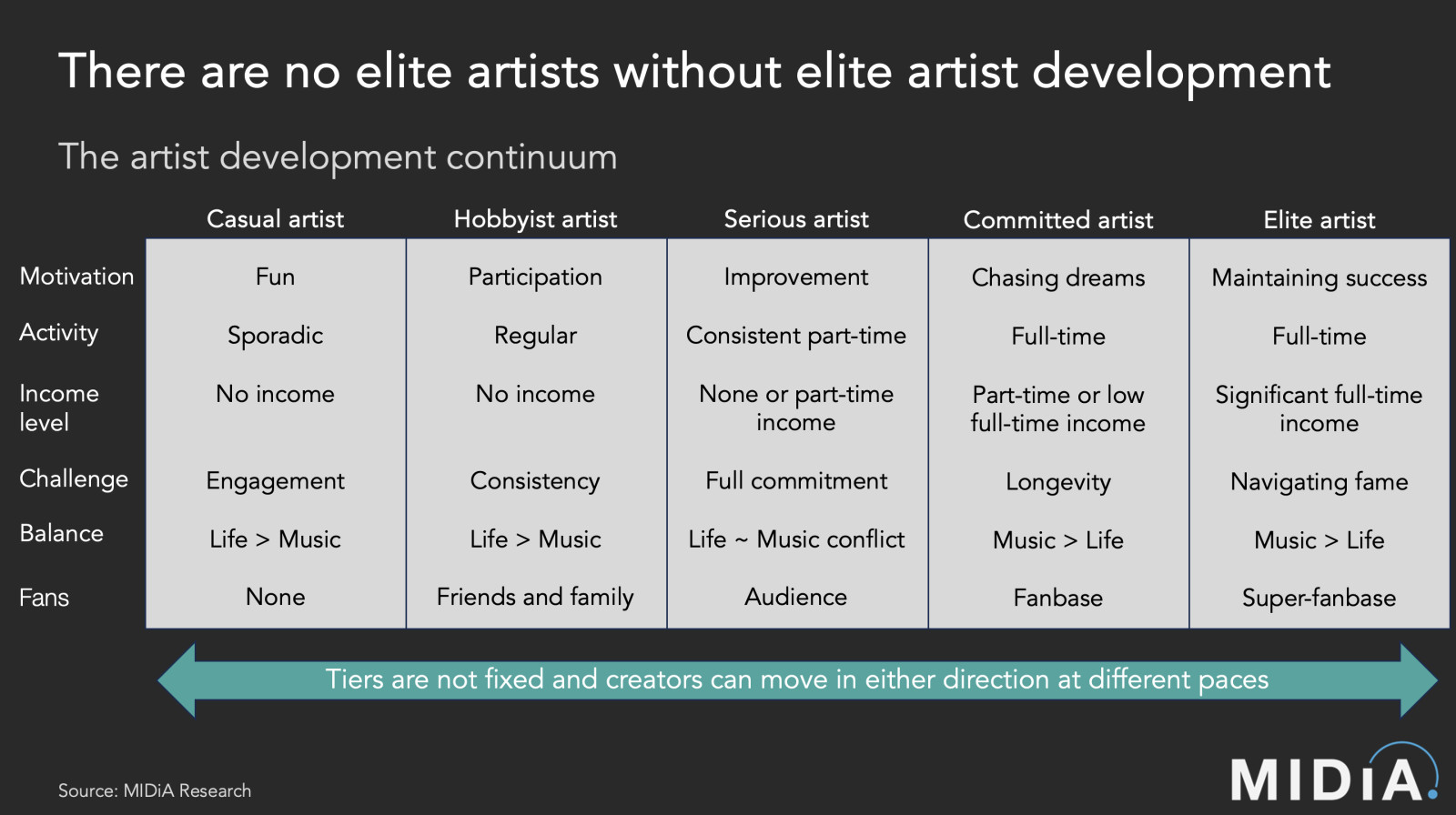There are no elite artists without elite artist development


A recent interview with Mariah the Scientist saw her speak about the struggle of performing for only the second time in front of a crowd at one of the world’s biggest festivals, Rolling Loud. She shared that she “wasn’t good at it”, “did not know what she was doing”, and ultimately suffered from the consequences of all the criticism that followed.
She is certainly not alone. Music industry veteran Donald Passman recently spoke about artists that “have a billion streams but have never played in front of a live audience”. An exaggeration, but not too far off from the truth.
Whilst Mariah says the experience has helped her learn and grow, it highlights a bigger issue in today’s music industry. Any creator can potentially be catapulted into virality and subsequently placed on platforms that expect elite performance(s). The lack of artist development (i.e., 10,000 hours of practice) means they often are not able to deliver and that needs to change.
Artists must be more than a moment
The next generation of fans is not showing up for artists at venues as much as they are showing up for moments on social media. MIDiA Research consumer data shows that 16–24–year–olds are more likely to discover music through a viral trend than they are likely to go to see live music. Essentially, artists investing in making viral hooks for short-form platforms are more likely to reach the next generation of music fans than those who build their audience on the live circuit.
However, making one viral hook does not make you an elite artist, and more artists are being launched onto stages that they simply are not ready for. The solution is not merely more investment in developing talent, there must be more investment in infrastructure that develops and sustains elite talent.
Athletics and sports teams cultivate elite talent with academies and facilities that support the development of athletes from early childhood. Compared to this, the commercial music industry lacks the infrastructure or systems to enable the same level of development. However, HYBE Entertainment’s success in developing new artists is a great example of how to reap the rewards of investing in talent development.
Featured Report
Ad-supported music market shares Spotify ascending
Ad-supported streaming has always occupied a unique and slightly contentious place in the music industry ecosystem. On the one hand, ad-supported still represents an effective way to reach consumers at scale, creating a wider subscriber acquisition funnel.
Find out more…Developing elite artists
HYBE are looking to show that leaning into competition can breed elite success, with founder, Bang Si-Hyuk, firmly believing that artists should develop and train to the same standards as elite athletes (albeit with more creative freedom and autonomy). This can mean years of academy training from a young age before being unleashed on the big stage. HYBE and Geffen’s collaboration on The Debut: Dream Academy is also a perfect example in the belief that developing elite artists and groups happens in an environment of elite competition. The show plays out for fans on social media as selected participants battle it out in a survival-style format.
Of course, not every scene or fanbase wants to see artists produced through competition. Fans still want authenticity and the frequent conversations around ‘industry plants’ show an enduring aversion to manufactured success. However, like professional athletes, very few artists independently striving for success without a support system (i.e., managers, producers, coaches etc.) will perform at an elite level. Becoming an elite artist has never been more competitive and the teams around the artists are often as fundamental to progress and longevity as the artists themselves.
Artists will keep going viral and many will do so independently, but virality is not an indicator of capability to deliver elite performances. Artist development is not only a way to raise the standard of these artists. It also presents a key opportunity to engage fans on the journey toward becoming an elite artist. Artists and fans stand to benefit from an increased focus on artist development.
What about non-elite artists?
It is also important to recognise that just because someone makes music, does not mean that they are ready to commit to developing to an elite standard. Most runners are not going to the Olympics and the running industry does not treat them as if they were. However, in music, there is a lack of appreciation for how not all artists releasing on streaming platforms will have the same standard of success.
By recognising that elite talent is built on a bedrock of commitment, we can accept that most artists simply have not made the sacrifices or built the team to make it at an elite level. However, as it is with athletics, there are too many mental and social benefits from making music to make engagement conditional with the potential for elite success.
Casual, hobbyist, and even serious artists, songwriters, and producers can still find fulfilment from music without fame or fortune. The creator tools and artist services industries are best positioned to deliver more ways for creators to have fun, engage with music-making, and set goals without imposing the pressure of making it at an elite level. However, for an industry looking at monetising the next generation of elite talent, the question must be asked – what more can be done to help cultivate it?

The discussion around this post has not yet got started, be the first to add an opinion.